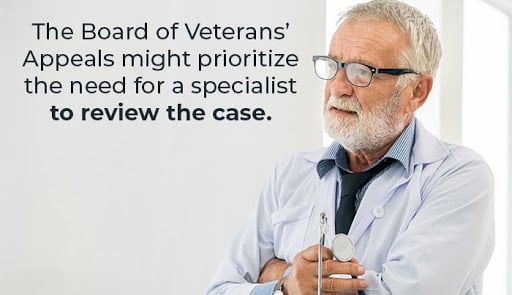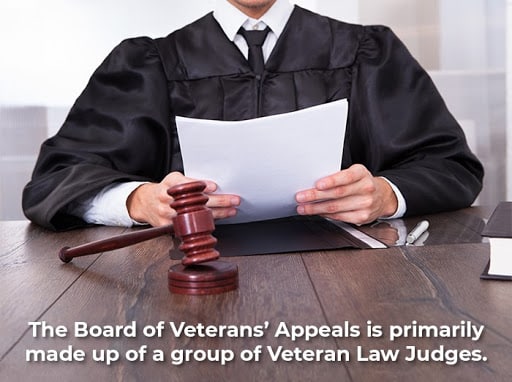The Board of Veterans’ Appeals (BVA) is located in Washington D.C. and it was created to give service members the chance to advocate for themselves if they have a disability that hinders their income potential.
We’ll look at who’s in the administration, how it affects the outcome of a case, and why you should consider appealing if you’ve been turned down for disability benefits.
What Is the BVA?
In order to understand BVA decisions, you must first understand how the US Department of Veterans Affairs works.
The organization is staffed with a number of professionals with direct experience in veteran rights and benefits.
It’s designed to be a resource for veterans to use if they want to buy a home, pursue higher education after high school, or receive financial assistance for certain medical conditions or disorders.
However, while there’s no doubt that the people employed by the VA are qualified to make a wide variety of decisions, it doesn’t mean they never make mistakes.
The BVA serves as a type of court system for the VA. The board is granted the ability to overturn the decisions of the VA after reviewing the case.

What Kinds of Cases Will the Board Review?
Nearly all of the claims that are reviewed stem from VA disability cases.
However, the board does sometimes review other types of cases, including those related to insurance, health care, education, or loan benefits even though these are far less common.
Regardless of the subject matter of the claim, it’s important for veterans to know that they have this option to get a second opinion.
Why Are Disability Claims Appealed So Often?
When a veteran has a disability claim, they usually go through their VA’s regional office (RO).
This is where the initial paperwork is submitted in accordance with veterans law.
From there, the VA determines the next steps to take. It may have the applicant fill out an additional VA form or go back to their original doctor for more information.
They’ll generally request that the veteran visits a doctor of their choosing to get a second opinion about the cause and severity of a person’s disability.
However, medical conditions are far from straightforward and much of it comes down to the opinion of the doctor who reviews the case.
If the VA doctor does not agree with the veteran’s primary doctor, the RO is not required to rule against the applicant.
If they do choose to agree with their selected doctor, it’s easy to see why a veteran would not want to give up their quest for benefits.
It’s why the Appeals Modernization Act was created to help veterans receive fair treatment in the case of a denial.

How Are Cases Reviewed?
BVA will look at cases with a fresh perspective before making its decision.
There are a few reasons for doing this.
On the one hand, it’s possible for the decision-makers at the VA to be too close to a case, which might result in their missing the bigger picture.
The BVA might also prioritize the need for a specialist to review the matter.
For example, let’s say that a veteran is claiming to suffer from PTSD from their time in the service.
They also have a diagnosis from their doctor stating that the PTSD is related to their time in the service.
After seeing the VA doctor though, they receive a diagnosis of garden-variety depression that is unrelated to their service duties.
If the case is denied and then appealed through the BVA, the board is likely to hand the case over to a professional with expertise in distinguishing between the two conditions.
To avoid potential biases, the BVA will start with an entirely clean slate.
You can choose to appeal any case related to the benefits administered by the VA.
The BVA has the authority to judge and rule over it all.
This is why it’s so important for veterans to have as much information as possible before submitting an appeal.
The BVA is not bound by any decisions that the RO has made, which can give veterans an edge (especially if they’ve already been dealing with the RO for weeks or months on end).
Who Sits on the BVA?
The BVA is primarily made up of a group of Veteran Law Judges, known as the Members of the Board.
There’s also a Vice Chairman and a Chairman who sit at the top of the hierarchy.
There is no minimum member of judges at the BVA.
The total count will depend on how many appeals are being processed at any given time.

There’s also an administrative staff who will serve the judges by assisting with paperwork, reviewing claims, and otherwise handling day-to-day matters.
The board is financed and staffed, in part, by the reports that are presented by the Chairman that show the volume and necessary resources the board needs to continue operating.
Who Makes the Final Ruling on My Case?
It’s the judges that make the decisions based on the submitted evidence. Whether you have cancer that was caused by Agent Orange or COVID-19 that was exacerbated from a primary service-related disability, the judge will go over it all before deciding.
The support staff will read cases, verify facts, and determine the strength of the evidence, but they are ultimately not allowed to make a ruling.
Will I Need to Attend a Hearing?
There is no need to attend a hearing with the BVA, though you do have the option to ask for one.
This can be done either in-person or over a videoconferencing platform.
If you choose this route, you’ll be going in front of the judge to fully appeal your case.
As a general rule of thumb, it’s recommended that veterans do request BVA hearings because it gives them a chance to argue the claim in their own words.
This can be a powerful way to breathe life into the paperwork and help the judge see you as a veteran who is reaching out for help.
Is The BVA My Best Choice?
Attorneys Matthew Hill and Carol Ponton explain whether or not you should go before the Board for your appeals process.
Hill & Ponton’s VA-accredited attorneys can fight on your behalf and make the right choices for your appeal. Request a free evaluation here to see how we can help.
Free case evaluationCan I Appeal the BVA’s Decision?
Yes. You can go through the US Court of Appeals or you can appeal through the board again.
It should be noted that BVA’s decisions are typically seen as final, meaning it’s difficult to get the judges to reverse their rulings. (It’s also impossible for the RO to reverse the ruling.)
If you do choose to appeal to the board, you have one of three options. You can either ask them to reconsider or ask them to start the case over again. Finally, if there was a clear error in the case, you can ask the board to revise its decision too.
“Clear and Unmistakable Error” in VA Appeals
There’s a specific type of error that the Board of Veterans’ Appeals (BVA) might make called a “Clear and Unmistakable Error” or CUE. Think of it as a big mistake in the VA’s decision about your claim.
If the VA didn’t have all the facts, or if they applied the rules wrong back when they decided your claim, it might be a CUE. But, it’s got to be a mistake so clear that everyone would agree it changed the outcome of your claim.
Now, not every error is a CUE. For example, if a new medical test shows something different from what the VA had before, that’s not a CUE. And the VA’s decision about how much weight to give certain evidence isn’t a CUE either.
What counts is if the BVA didn’t use the right rule, or used it the wrong way. And that error should be so big that, without it, the BVA would’ve decided differently.
Here’s why it’s important: If you prove there was a CUE, the VA might have to backdate your benefits to when you first made the claim. This could mean more money for you. But, remember, there are special rules about when and how you can claim a CUE.
The process can be a bit tricky. You need to write down the specifics of the error and how it affected your claim. And once you bring up a CUE claim, you usually get just one shot at it, so make it count.
In short, CUE is a narrow window, but if your claim fits through it, you might see a big difference. If you think the BVA made this kind of error on your case, it might be time to look into a CUE.
Get Help with Your Appeal
Hill & Ponton VA-accredited attorneys are here to support you throughout this process. Contact us for a free case evaluation to see if we can help with your appeal.



